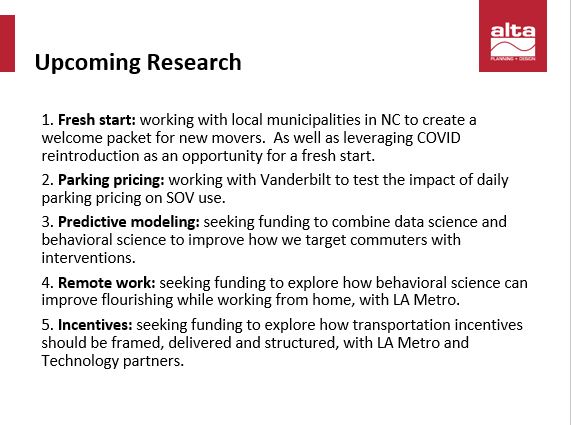Whew! Tired but energized from great #WalkBikePlaces on Integrating Human Emotion & Cognition into Active Transportation Projects. A few highlights for you all below. @PPS_Placemaking
1. Financial & non-financial incentives can change time of travel, reduce parking demand, & reduce driving
Tang et al 2016; Merugu et al. 2009; Fanping 2015; Zhu, Yue, 2015; Lee, Chanyoung et al 2013; Rosenfield, Attanucci, Zhao; Bauer et al 2018; SFCTA/FTA 2018 & 2019; CTA 2017
Tang et al 2016; Merugu et al. 2009; Fanping 2015; Zhu, Yue, 2015; Lee, Chanyoung et al 2013; Rosenfield, Attanucci, Zhao; Bauer et al 2018; SFCTA/FTA 2018 & 2019; CTA 2017
2. Providing people with personalized trip plans can change their commute mode choice.
Möser & Bamberg, 2008; Fujii 2006; Chatterjee 2009; Meloni & Sanjust di Teulada, 2016; Bartle, Caroline, & Avineri 2012 + current Durham research by @JoeySherlock1 at @advncdhindsight
Möser & Bamberg, 2008; Fujii 2006; Chatterjee 2009; Meloni & Sanjust di Teulada, 2016; Bartle, Caroline, & Avineri 2012 + current Durham research by @JoeySherlock1 at @advncdhindsight
3. People have an irrational response to things that are free - parking (= bad) & transit passes (= good).
Hess, 2001; Rosenfield, Attanucci, Zhao (under review); Thøgersen & Muller 2008; Thøgersen 2009; Fujii & Kitamura, 2003; Bachman & Katzev 1982; Bamberg 2008; Ghimire 2019
Hess, 2001; Rosenfield, Attanucci, Zhao (under review); Thøgersen & Muller 2008; Thøgersen 2009; Fujii & Kitamura, 2003; Bachman & Katzev 1982; Bamberg 2008; Ghimire 2019
4. Shifting from all-you-can-eat to a la carte leads to reduced consumption (evidence on parking & carsharing)
Rosenfield, Attanucci, Zhao (under review); Cervero 2002
Rosenfield, Attanucci, Zhao (under review); Cervero 2002
5. Moments of habit disruption are good times to intervene - especially moving homes
Kirkman 2019; Bamberg 2006; Verplanken, Walker, Davis & Jurasek 2008; Thøgersen 2012; Fujii, Gärling, Kitamura 2001
Kirkman 2019; Bamberg 2006; Verplanken, Walker, Davis & Jurasek 2008; Thøgersen 2012; Fujii, Gärling, Kitamura 2001
6. One study seemed to show that proving information resulted in behavior change, which was surprising/against accepted truisms: Garvill et al. 2003
7. Interventions that interrupt the driving habit can work:
A. Deliberate choicemaking
B. Pre-planning
C. Action/coping planning
Eriksson, Garvill, Nordlund 2008; Fujii & Taniguchi 2005; Garvill et al 2003; Hsieh, Kanda, Fujii 2017
A. Deliberate choicemaking
B. Pre-planning
C. Action/coping planning
Eriksson, Garvill, Nordlund 2008; Fujii & Taniguchi 2005; Garvill et al 2003; Hsieh, Kanda, Fujii 2017
Done w/ lit review, on to other topics. Here are examples of using behavioral science for traffic safety:
https://usa.streetsblog.org/2018/10/18/want-drivers-to-yield-to-pedestrians-you-gotta-play-mind-games/ (h/t to the brilliant @NicholeLMorris !)
https://www.bhub.org/project/zusha-to-protest-in-swahili/
https://thedecisionlab.com/insights/society/can-emojis-prevent-speeding/
https://www.wired.com/2010/12/swedish-speed-camera-pays-drivers-to-slow-down/
https://usa.streetsblog.org/2018/10/18/want-drivers-to-yield-to-pedestrians-you-gotta-play-mind-games/ (h/t to the brilliant @NicholeLMorris !)
https://www.bhub.org/project/zusha-to-protest-in-swahili/
https://thedecisionlab.com/insights/society/can-emojis-prevent-speeding/
https://www.wired.com/2010/12/swedish-speed-camera-pays-drivers-to-slow-down/
Shout out also to @B_I_Tweets for their foundational EAST framework ( https://www.behaviouralinsights.co.uk/wp-content/uploads/2015/07/BIT-Publication-EAST_FA_WEB.pdf), which I apply to bike sharing here ( https://bikeportland.org/2016/08/25/the-secret-to-portlands-bike-share-success-explained-with-the-science-of-behavior-change-190246)
To learn more about @ashleywhillans and @joeysherlock1 brilliant recent & upcoming work, check out @EnoTrans webinar ( https://www.enotrans.org/event/road-to-recovery-webinar-behavioral-science-101/), CommuteCon session ( https://commutecon.com/commutecon-2020/behavioral-tdm-joseph-sherlock), & slide below

 Read on Twitter
Read on Twitter



